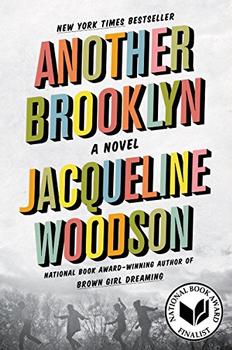Summary | Excerpt | Reviews | Beyond the Book | Readalikes | Genres & Themes | Author Bio

A Novel
by Jacqueline Woodson1
For a long time, my mother wasn't dead yet. Mine could have been a more tragic story. My father could have given in to the bottle or the needle or a woman and left my brother and me to care for ourselves—or worse, in the care of New York City Children's Services, where, my father said, there was seldom a happy ending. But this didn't happen. I know now that what is tragic isn't the moment. It is the memory.
If we had had jazz, would we have survived differently? If we had known our story was a blues with a refrain running through it, would we have lifted our heads, said to each other, This is memory again and again until the living made sense? Where would we be now if we had known there was a melody to our madness? Because even though Sylvia, Angela, Gigi, and I came together like a jazz improv—half notes tentatively moving toward one another until the ensemble found its footing and the music felt like it had always been playing—we didn't have jazz to know this was who we were. We had the Top 40 music of the 1970s trying to tell our story. It never quite figured us out.
The summer I turned fifteen, my father sent me to a woman he had found through his fellow Nation of Islam brothers. An educated sister, he said, who I could talk to. By then, I was barely speaking. Where words had once flowed easily, I was suddenly silent, breath snatched from me, replaced by a melancholy my family couldn't understand.
Sister Sonja was a thin woman, her brown face all angles beneath a black hijab. So this is who the therapist became to me—the woman with the hijab, fingers tapered, dark eyes questioning. By then, maybe it was too late.
Who hasn't walked through a life of small tragedies? Sister Sonja often asked me, as though to understand the depth and breadth of human suffering would be enough to pull me outside of my own.
Somehow, my brother and I grew up motherless yet halfway whole. My brother had the faith my father brought him to, and for a long time, I had Sylvia, Angela, and Gigi, the four of us sharing the weight of growing up Girl in Brooklyn, as though it was a bag of stones we passed among ourselves saying, Here. Help me carry this.
Twenty years have passed since my childhood. This morning, we buried my father. My brother and I stood shoulder to shoulder at the gravesite, willows weeping down around us, nearly bare-branched against the snow. The brothers and sisters from mosque surrounding us. In the silver light of the morning, my brother reached for and found my gloved hand.
Afterward, at a diner in Linden, New Jersey, my brother pulled off his black coat. Beneath it, he wore a black turtleneck and black wool pants. The black kufi his wife had knitted for him stopped just above his brow.
The diner smelled of coffee and bread and bleach. A neon sign flickered eat here now in bright green, dusty silver tinsel draping below it. I had spent Christmas Day at the hospital, my father moaning for pain medication, the nurses too slow in responding.
A waitress brought my brother more hot water for his mint tea. I picked at my eggs and lukewarm home fries, having eaten the bacon slowly to tease my brother.
You hanging in, Big Sis? he asked, his deep voice breaking up a bit.
I'm good.
Still whole?
Still whole.
Still eating pork and all the other Devil's food, I see.
Everything but the grunt.
We laughed, the joke an old one from the afternoons I had snuck off with my girls to the bodega around the corner for the foods I was forbidden to eat at home and the bits of bacon still on my plate.
You still could come stay with me and Alafia you know. Bedrest isn't contagious.
I'm good at the apartment, I said. Lots to be done there. All his stuff to go through . . . Alafia doing okay?
Excerpted from Another Brooklyn by Jacqueline Woodson. Copyright © 2016 by Jacqueline Woodson. Excerpted by permission of Amistad. All rights reserved. No part of this excerpt may be reproduced or reprinted without permission in writing from the publisher.
We must believe in luck. For how else can we explain the success of those we don't like?
Click Here to find out who said this, as well as discovering other famous literary quotes!
Your guide toexceptional books
BookBrowse seeks out and recommends the best in contemporary fiction and nonfiction—books that not only engage and entertain but also deepen our understanding of ourselves and the world around us.